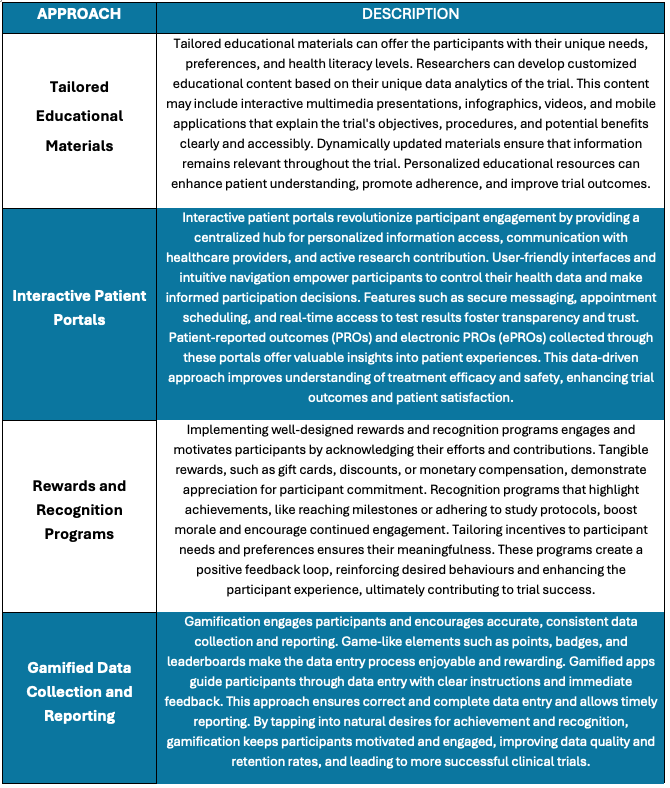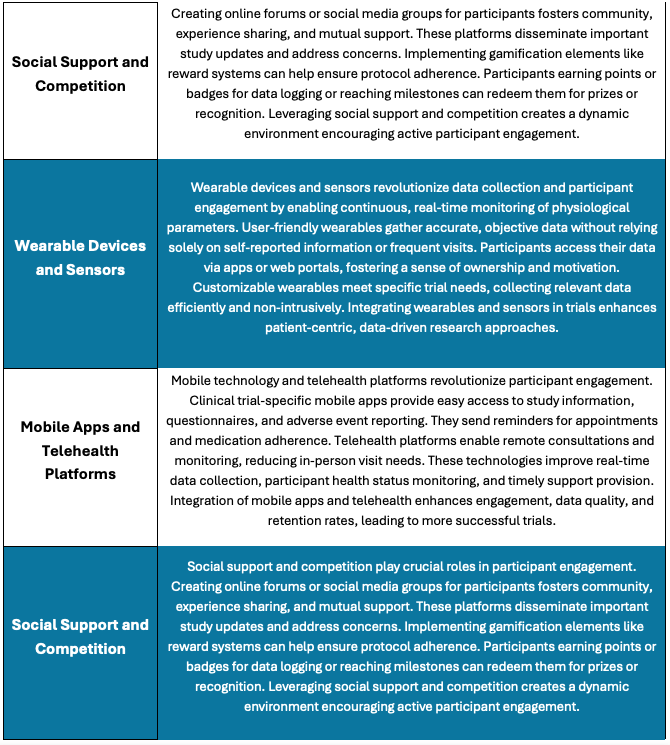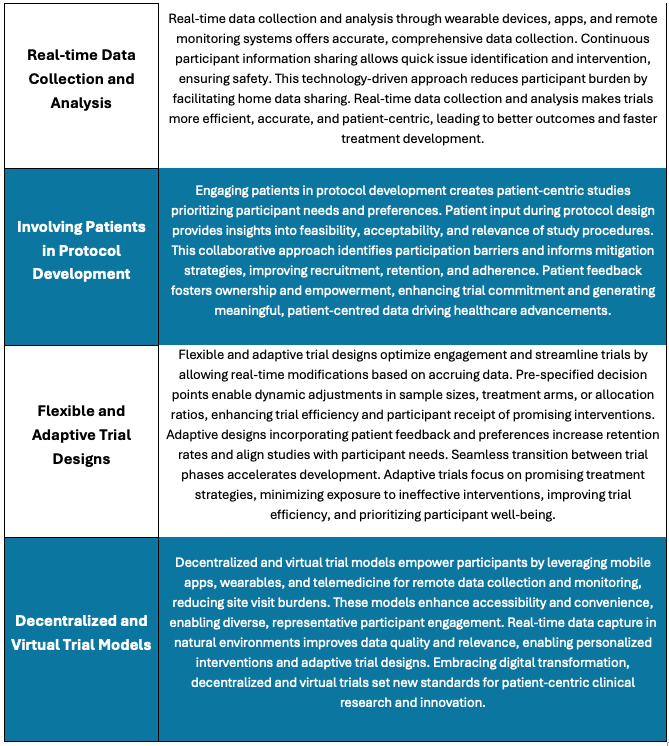1. Introduction
Patient engagement is a critical component of successful clinical trials. In the era of data-driven healthcare, it has become increasingly evident that actively involving patients in the research process can lead to more efficient, effective, and patient-centered clinical trials. By empowering patients to take an active role in their own health and treatment, researchers can gather valuable insights, improve participant retention, and ultimately, accelerate the development of new therapies.
Engaged patients are more likely to adhere to study protocols, provide accurate and comprehensive data, and offer unique perspectives on the impact of a treatment on their quality of life. Furthermore, by fostering a collaborative relationship between patients and researchers, patient engagement can help build trust in the clinical trial process and enhance the overall patient experience. As the healthcare industry continues to embrace data-driven approaches, it is essential to recognize the importance of patient engagement and develop innovative strategies to involve participants in every stage of the clinical trial process.
A shift towards data-driven research
The healthcare industry is witnessing a significant shift towards data-driven research, which is revolutionizing the way clinical trials are conducted. With the advent of advanced technologies such as artificial intelligence, machine learning, and big data analytics, researchers now have access to vast amounts of patient data that can be leveraged to gain valuable insights into disease progression, treatment efficacy, and patient outcomes. This data-driven approach enables researchers to make more informed decisions, optimize trial designs, and accelerate the drug discovery process. By harnessing the power of data, clinical trials can become more efficient, cost-effective, and patient-centric. Moreover, data-driven research allows for the identification of novel biomarkers and the development of personalized medicine approaches, which can greatly improve patient outcomes. As the healthcare industry continues to embrace data-driven research, it is crucial to ensure that patients are actively engaged in the process and that their privacy and data security are protected. By combining data-driven approaches with patient engagement strategies, clinical trials can become more inclusive, transparent, and empowering for all stakeholders involved.
In traditional clinical trials, patient involvement is often limited, leading to a lack of understanding and engagement. Participants are frequently treated as mere subjects, with little opportunity to actively contribute to the research process. This lack of involvement can result in a poor understanding of the trial's purpose, procedures, and potential benefits, which may lead to reduced adherence to study protocols and increased dropout rates. Moreover, the complex scientific language used in informed consent forms and other study materials can be difficult for patients to comprehend, further exacerbating the problem. This communication gap between researchers and participants can hinder the success of clinical trials. To address these challenges, innovative strategies are needed to empower patients and foster their active involvement in data-driven clinical trials.
2. Benefits of empowering study participants as active members of the clinical trials
There are many benefits to empower patients as active participants in the clinical trials an enhance their engagement. Empowering patients as active participants in clinical trials offers numerous advantages that can significantly enhance the overall success and impact of these studies. By involving patients in the decision-making process and valuing their insights, researchers can gain a deeper understanding of the patient experience, leading to more patient-centric trial designs. This approach not only improves patient satisfaction but also increases their commitment to the study, resulting in higher retention rates and more reliable data. Moreover, empowered patients are more likely to adhere to the study protocol, as they feel a sense of ownership and responsibility towards the trial's success. Additionally, by leveraging patient networks and advocacy groups, researchers can tap into a wealth of knowledge and resources, facilitating more effective recruitment strategies and ensuring that the trial's objectives align with the needs and priorities of the patient community. Ultimately, empowering patients as active participants in clinical trials fosters a collaborative and inclusive research environment, leading to more meaningful and impactful results that can drive advancements in healthcare and improve patient outcomes.
3. Innovative Strategies for Enhancing Participant Engagement in Clinical Trials
Several innovative approaches can enhance participant engagement in clinical research studies. Few examples listed in the table below



4. Impact of such strategies on clinical trials outcomes

5. Enhancing Participant Engagement in Practice: Case study from Clinical Trials
A clinical trial using gamification to boost patient adherence
In a clinical trial GAME Adherence, researchers employed gamification techniques to enhance patient engagement and adherence. This is a two-arm randomized controlled trial to evaluate whether a gamification intervention plus involvement of a supportive partner (social support) and sending reports to physicians (accountability) increases medication adherence in patients with hypertension and hyperlipidemia. The goal is to randomize 84 patients with hypertension, hyperlipidemia, and a history of poor medication adherence seen in a single Penn Medicine clinic to an 18-week gamification intervention or to attention control text messages alone. By leveraging the power of gamification, the clinical trial could not only gathered crucial data but also empowered patients to take an active role in their own health management.
In a different review published in 2022, the aim was to synthesize and appraise the literature pertaining to the use of mobile apps containing gamification or financial incentives for medication adherence. Across the studies included in the analysis, gamification alone (9/11, 82%) was used more than financial incentives (1/11, 9%) alone or a combination of the two (1/11, 9%). The studies generally reported improved or sustained optimal medication adherence outcomes; however, there was significant heterogeneity in the patient population, methodology such as outcome measures, and reporting of these studies.
This approach could have the immense potential of innovative strategies in transforming the landscape of data-driven clinical trials.
6. Conclusions
Empowering patients in data-driven clinical trials has the potential to revolutionize the way we approach medical research and healthcare. When study particpants are actively invoved in the research process, we can tap into their unique perspectives, experiences, and insights, leading to more patient-centric and effective clinical trials. This collaborative approach can foster a sense of ownership and engagement among participants, encouraging them to adhere to study protocols and provide accurate, comprehensive data.
Moreover, empowering patients can help build trust between researchers and participants, as patients feel valued and respected as partners in the research process. This trust can lead to increased patient satisfaction, improved recruitment and retention rates, and ultimately, more successful clinical trials. The data collected through these patient-empowered trials can be more representative of real-world patient experiences, enabling researchers to develop treatments and interventions that better address patient needs and preferences.
As we continue to embrace data-driven approaches in clinical research, the transformative potential of patient empowerment cannot be overstated. We in fact can unlock new insights, drive innovation, and pave the way for more effective, patient-centered healthcare solutions.
7. References
1- https://www.ncbi.nlm.nih.gov/pmc/articles/PMC6799275/



https://www.ncbi.nlm.nih.gov/pmc/articles/PMC8902658/







